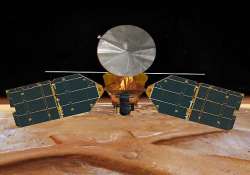India to send Mars orbiter spacecraft: ISRO chairman
Bhubaneswar, Jan 24: Describing prospects of India's space programme as exciting and challenging, ISRO Chairman Dr K Radhakrishnan on Wednesday said the country's next venture would be the Mars orbiter mission while the first navigation

Bhubaneswar, Jan 24: Describing prospects of India's space programme as exciting and challenging, ISRO Chairman Dr K Radhakrishnan on Wednesday said the country's next venture would be the Mars orbiter mission while the first navigation satellite is slated to be launched by June this year.
Mars has played a major role in evolution of life on earth and the next mission is the Mars orbiter mission, Radhakrishnan said during an interaction with students of KIIT University here.
“The first navigation satellite is slated to be launched by June this year. Chandrayan-I is a major step towards lunar and planetary exploration,” Radhakrishnan, also Chairman of Space Commission and Secretary, Department of Space, said.
“The next major objective of ISRO is to have a GSLV rocket, which is scheduled to be launched by May,” he said.
Stating that the Indian Space Research organisation (ISRO) was now focussing on satellites and launch vehicles, he said prospects and the way forward for India's space programme “is exciting and challenging”.
“India is planning to have a navigation satellite system, called Indian Regional Navigation Satellite, planned in 2013,” he said, adding that six more such satellites would be launched in eighteen months.
Radhakrishnan said while most scientific organisations were researching about life and evolution, ISRO put importance on the study of the Moon, Mars and the Sun.
He said the environment of Moon and planets including Mars were missions of the future. “It is projected that by 2030 or 2040 Moon will be an intermediate station for moving to Mars.”
On space enterprise, he said several satellites were carrying out important functions in communication, medication and global processing system, according to a release from KIIT university.
The turnover of space enterprises in the world was about USD 177 billion in 2012-13.
US, Russia, China and others were into high technology, including putting human beings in space, while India's focus for last 50 years was essential application oriented programmes, in which it had become a role model, he said, adding India was among top six space-faring countries.
On academic research, the ISRO chief said many institutes had joined it for development of multi-disciplinary technology.
Academic institutions would continue to play an even greater role in the future. “Launch of a satellite is a team work involving more than 2,000 (persons),” he said.
Mars has played a major role in evolution of life on earth and the next mission is the Mars orbiter mission, Radhakrishnan said during an interaction with students of KIIT University here.
“The first navigation satellite is slated to be launched by June this year. Chandrayan-I is a major step towards lunar and planetary exploration,” Radhakrishnan, also Chairman of Space Commission and Secretary, Department of Space, said.
“The next major objective of ISRO is to have a GSLV rocket, which is scheduled to be launched by May,” he said.
Stating that the Indian Space Research organisation (ISRO) was now focussing on satellites and launch vehicles, he said prospects and the way forward for India's space programme “is exciting and challenging”.
“India is planning to have a navigation satellite system, called Indian Regional Navigation Satellite, planned in 2013,” he said, adding that six more such satellites would be launched in eighteen months.
Radhakrishnan said while most scientific organisations were researching about life and evolution, ISRO put importance on the study of the Moon, Mars and the Sun.
He said the environment of Moon and planets including Mars were missions of the future. “It is projected that by 2030 or 2040 Moon will be an intermediate station for moving to Mars.”
On space enterprise, he said several satellites were carrying out important functions in communication, medication and global processing system, according to a release from KIIT university.
The turnover of space enterprises in the world was about USD 177 billion in 2012-13.
US, Russia, China and others were into high technology, including putting human beings in space, while India's focus for last 50 years was essential application oriented programmes, in which it had become a role model, he said, adding India was among top six space-faring countries.
On academic research, the ISRO chief said many institutes had joined it for development of multi-disciplinary technology.
Academic institutions would continue to play an even greater role in the future. “Launch of a satellite is a team work involving more than 2,000 (persons),” he said.